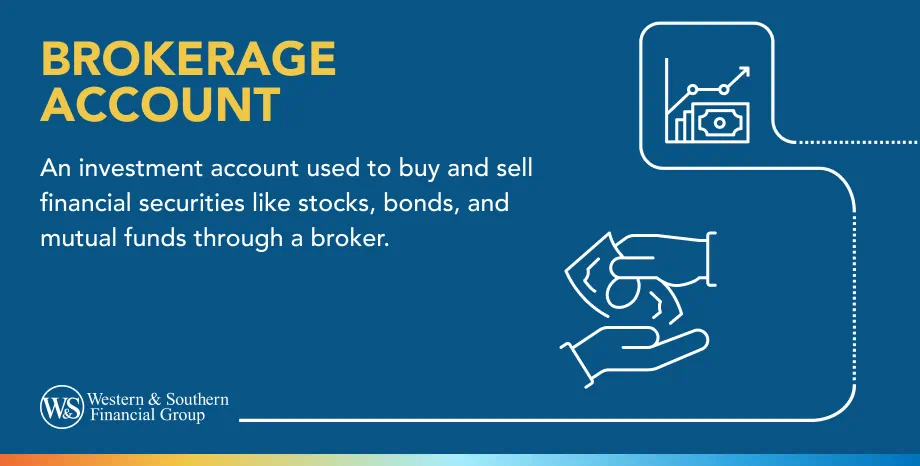

Key Takeaways
- A brokerage account lets you buy and sell various investments, including stocks, bonds, mutual funds, and ETFs.
- Unlike retirement accounts, brokerage accounts offer flexibility with no penalties for withdrawals, but they are subject to annual income taxes on earnings.
- SIPC protection covers up to $500,000 in securities and cash if a brokerage firm fails but does not shield against market losses.
- Individual brokerage accounts offer sole ownership and control, while joint accounts enable multiple individuals to manage investments together.
- A brokerage account is a versatile tool for growing wealth, helping provide access to diverse investments and personalized strategies based on your financial goals.
Understanding Brokerage Accounts
A brokerage account is a financial account that allows you to buy and sell securities, including stocks, bonds, mutual funds, ETFs, and other investment productions.1 It's different from a bank account in that it doesn't hold cash for day-to-day expenses; instead, it allows you to potentially grow wealth by investing in the financial markets.
Additionally, brokerage accounts can serve as a flexible tool for individuals looking to supplement their Social Security benefits with additional sources of income through market investments.
While retirement accounts offer tax benefits—like tax-deferred growth or tax-free withdrawals in the case of Roth IRAs—brokerage accounts are taxed annually. This means any gains you make through selling stocks or receiving dividends will be considered taxable income and subject to income taxes.
Key Features of a Brokerage Account:
- Variety of investments: You can choose from a wide range of securities such as stocks, bonds, mutual funds, ETFs, and more.
- Flexibility: Unlike retirement accounts, there's no penalty for withdrawing funds whenever you want.
- Growth potential: While market gains can help grow your wealth, there's also a risk of market losses.
- Income taxes: Any earnings, such as dividends or capital gains, are taxed as taxable income in the year they are earned.
Securities Investor Protection Corporation (SIPC) Protection
Most brokerage accounts are protected by the Securities Investor Protection Corporation (SIPC), which insures up to $500,000 in securities and cash if the brokerage firm fails.2 However, SIPC does not protect against market losses or poor investment decisions.
Types of Brokerage Accounts
When looking to invest, it's essential to understand the different types of brokerage accounts available. Choosing the right one can make managing your investments easier and help you meet your financial goals. Here, we explore two common types: individual and joint brokerage accounts.
Individual Brokerage Accounts
An individual brokerage account is owned by a single person. This account allows you to buy and sell various investments like:
-
Stocks
-
Bonds
-
ETFs
-
Mutual funds
All assets and transactions are attributed solely to the account holder, making it straightforward to manage. Taxes on earnings, including capital gains or dividends, are also the sole responsibility of the account owner. Individual accounts offer flexibility, allowing investors to work towards personal goals, whether saving for retirement or building wealth over time.
Joint Brokerage Accounts
Joint brokerage accounts are owned by two or more individuals, often spouses or family members. These accounts allow co-owners to pool their investments and manage them together. There are different types of joint accounts, including:
-
Joint Tenants with Rights of Survivorship (JTWROS)
-
Tenants in Common (TIC)
Each type has distinct ways of handling assets if one owner passes away. Joint accounts can be a convenient way to invest as a couple or share financial goals, but it’s important to understand the implications for taxes and access, as all owners have equal rights to the assets.
Both individual and joint brokerage accounts offer unique advantages, and the right choice depends on your financial situation and investment goals. If you prefer full control over your investments, an individual account might be ideal. On the other hand, joint accounts are a good option for those looking to manage investments collaboratively.
How Brokerage Accounts Work
Once you've opened a brokerage account, here’s how the process works:
- Deposit Funds: Start by depositing money from your bank into the brokerage account. These additional funds will be used to purchase securities.
- Select Investments: Choose which investments to buy, whether it's individual stocks, bonds, mutual funds, or ETFs. Your selection will depend on your investment objectives and risk tolerance.
- Track and Manage Your Portfolio: Many brokers offer tools to track your portfolio’s performance. You can see how each investment performs and adjust your strategy as needed.
- Buy and Sell: You can buy and sell investments whenever you want.
Common Types of Investments in a Brokerage Account
Brokerage accounts allow you to invest in a variety of investments, including:
- Stocks: Buy shares in individual companies.
- Bonds: Purchase debt issued by companies or governments.
- Mutual Funds: Invest in a professionally managed fund that pools money from many investors.
- ETFs: Collection of securities that are grouped together based on specific objectives that can be bought and sold on an exchange.
Why Consider a Brokerage Account?
If you’re looking to build wealth, supplement your retirement, or save for a significant purchase, a brokerage account can help you meet your savings goal. Here are some reasons to consider opening a brokerage account:
1. Flexibility
With a standard brokerage account, there are no restrictions on when you can withdraw funds, unlike retirement accounts that penalize early withdrawals. This flexibility is ideal for investors needing access to their funds before retirement.
2. No Contribution Limits
Unlike retirement accounts such as IRAs or 401(k)s, taxable brokerage accounts have no contribution limits. You can invest as much as you want, whenever you want, without restrictions.
3. Diverse Investment Options
A brokerage account offers access to a wide variety of investments. You can create a diversified portfolio of stocks, bonds, mutual funds, ETFs, and other securities to help manage risk and achieve your long-term financial goals.
Many brokerage platforms provide educational resources that can help investors learn more about the market, investment strategies, and how different investment products work.
How to Open a Brokerage Account
Opening a brokerage account is straightforward and can usually be done online. Follow these steps to start investing:
- Choose a Broker: Decide whether you want to use a discount broker or a full-service broker. Discount brokers are cost-effective for self-directed investors, while full-service brokers offer personalized financial planning for a higher fee.
- Select the Right Account Type: Choose between an individual or joint brokerage account based on your goals.
- Fund Your Account: Once you’ve selected your brokerage firm and account type, you’ll need to transfer additional funds from your bank into the account.
- Start Investing: With your account funded, you’re ready to start purchasing securities. Whether you prefer stocks, ETFs, or mutual funds, you can begin building your portfolio.
In many cases, investors can enhance their financial education by reviewing brokerage firm materials or working with a financial advisor who can guide them on choosing the right account type and building a portfolio that complements other retirement assets, such as Social Security and pension income.
Pros & Cons of Brokerage Accounts
Every investment vehicle comes with its advantages and disadvantages.3 Here’s a look at the pros and cons of brokerage accounts:
Pros:
- Flexibility: No restrictions on contributions or withdrawals.
- Wide Range of Investment Options: Access to stocks, bonds, mutual funds, ETFs, and more.
- Growth Potential: Long-term investments can offer significant growth.
Cons:
- Taxes: Investment gains are subject to income taxes.
- Market Risk: The value of your investments can fluctuate, sometimes significantly.
- Fees: Some brokers may charge for trades, account maintenance, or advisory services.
Common Risks of Brokerage Accounts
While brokerage accounts offer many benefits, they come with risks:
1. Market Volatility
Stock market investments are subject to market fluctuations. While your portfolio may grow over time, it can also lose value during downturns.
2. Margin Trading Risks
Using a margin account can amplify your gains, but it also increases the risk of significant losses. If the market moves against you, you may owe more than your initial investment.
3. Tax Considerations
Earnings from a taxable brokerage account are subject to income taxes, including dividends, interest, and capital gains. It's important to understand how your investments impact your overall taxable income and plan accordingly.
Conclusion
A brokerage account is a versatile tool for building wealth and accessing various investments. It can help you save for retirement, buy a home, or grow your wealth. Understanding different investment types, risks, and portfolio management is key. With the right strategy and understanding of tax implications, a brokerage account can help grow your wealth over time.
Provided for informational purposes only. Not all products and services discussed are available through members of Western & Southern Financial Group.
Frequently Asked Questions
Can I withdraw money from a brokerage account?
Do you pay taxes on a brokerage account if you don't sell?
Are brokerage accounts safe?
Sources
- What Is a Brokerage Account? Definition, How to Choose, and Types. https://www.investopedia.com/terms/b/brokerageaccount.asp.
- What SIPC Protects. https://www.sipc.org/for-investors/what-sipc-protects.
- Pros and Cons of Brokerage Accounts. https://www.experian.com/blogs/ask-experian/pros-and-cons-brokerage-account/.



























